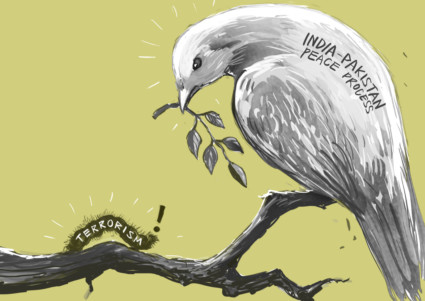
Al Qaida chief Ayman Al Zawahiri said last week he was opening a branch of the terror outfit focused on India, and in one sense that’s nothing new. The Egyptian doctor has dreamed for years of sparking a war between nuclear-armed India and Pakistan, a conflict he thinks would drive Pakistanis into the arms of radical Islam and rally Muslims around the world to Al Qaida’s banner.
Osama Bin Laden, Al Zawahiri’s boss at the time, preferred to keep the organisation’s focus on the United States, the ‘Great Satan’. If Al Zawahiri is to be believed, he started putting together his new India affiliate a little more than a year after Bin Laden’s death.
There’s little reason to think Al Zawahiri will be more successful now that he’s in charge. Although India is home to nearly as many Muslims as Pakistan is, the community has traditionally resisted extremist ideologies. Indian intelligence agencies have claimed victories recently against the few homegrown terrorist groups that have sprung up — in particular the Indian Mujahedeen, whose members are thought to have aided the 2008 Mumbai attacks.
PR stunt
If Al Zawahiri really had assembled a powerful underground organisation ready to strike within India, he could have announced its presence with a high-profile attack, rather than a rambling video. That’s led several commentators to conclude the announcement is a PR stunt, designed to win back some of the spotlight hogged by the Islamic State of Iraq and the Levant (Isil) in recent months.
No doubt there’s some truth to this explanation. Yet, few major militant groups or ideologues have switched their loyalties from Al Qaida to Isil; most can’t, as their leaders have sworn oaths of allegiance to Al Zawahiri. (Granted, the life spans of such figures tend to run short.) The decision of a few Indians or Indonesians to fight in Iraq doesn’t exactly pose an existential threat to Al Qaida.
Irrelevance does, however. Even before the rise of Isil, momentum had shifted from Al Qaida Prime, as its original core is known, to affiliates in places such as Yemen, as well as erstwhile allies such as the Pakistani Taliban. Holed up in Afghanistan or Pakistan, with his executive ranks thinned dramatically by US drone strikes, Al Zawahiri has failed to recapture the twisted glamour Bin Laden once brought to the organisation. He could use a new fight. And as Hamas leaders in Gaza might tell him, it doesn’t even need to be a fight he can win.
The success or failure of Al Zawahiri’s new initiative may rest on one man: India’s Hindu nationalist Prime Minister Narendra Modi. The fastest way to increase Al Qaida’s limited appeal in India would be for the authorities to overreact, as China has done with Uighurs in its restive Xinjiang province. This would not only alienate the best source of intelligence on homegrown radicals — the local Muslim community — it would rapidly burnish the appeal of radicals over more moderate voices.
Damaging scapegoating
Any government scapegoating of Indian Muslims would be equally damaging. Modi’s association with the 2002 anti-Muslim riots in Gujarat and the Hindu nationalist Rashtriya Swayamsevak Sangh make him a lightning rod for many Muslims. He bears a special responsibility to endorse the loyalty of Indian Muslims and assure them they will not be targeted unfairly.
Probably the best way to ensure Al Zawahiri’s grand designs never come to fruition would be for Modi to push forward the stalled India-Pakistan peace process.
As long as the wounds that divide the south Asian nations continue to fester, leaders on both sides will remain hostage to the actions of a few radicals: Any post-Mumbai terrorist plot in India that is traced back to Pakistan bears a high risk of setting off a wider conflagration.
Healing is easier said than done, especially since the Pakistani Army seems to have shrunk the civilian government’s room to manoeuvre on India policy. Still, that’s all the more reason for Modi to present himself as magnanimous and forward-looking, instead of posturing for his right-wing supporters. It’s the right way to respond to Al Zawahiri’s bluster — and the right thing to do.
— Washington Post
Nisid Hajari writes editorials on Asia for Bloomberg View.










